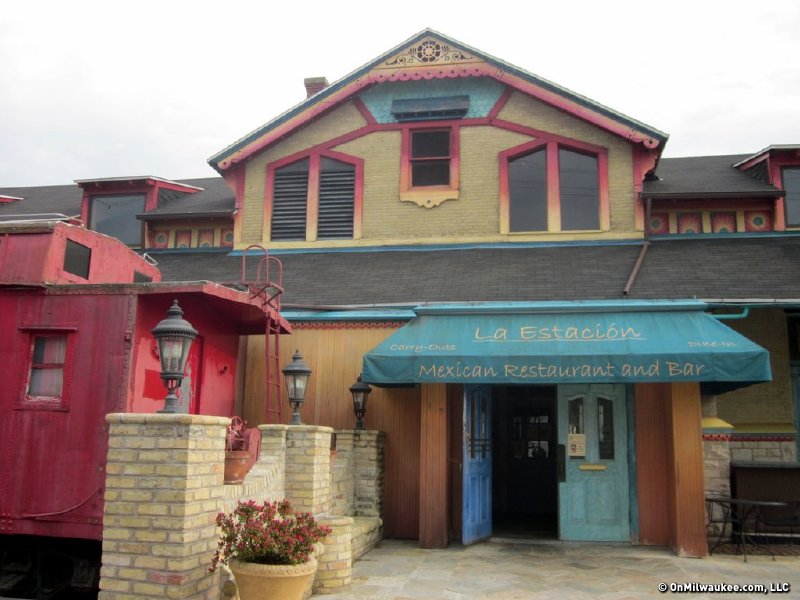Bienvenidos a Mexican Dining Week on OnMilwaukee.com. This week, in honor of Cinco de Mayo, we're spicing things up with daily articles about Mexican restaurants, foods, drinks, sweets and more. Enjoy a week of sizzling stories that will leave you craving Milwaukee's Latin offerings. Olé!
A food industry friend who is a Chicago native spent her childhood summers in Mexico, watching her aunts and uncles cook. A while back I asked her to name the Mexican restaurants she favors in the Milwaukee area.
She mentioned only two, Cempazuchi on Brady Street and La Estacion in Waukesha. "They make a Mexican beef stew at La Estacion that tastes just like my mother's," my friend said.
Cempazuchi receives a lot of deserved attention from foodies and diners eager to adventure beyond burritos and chimichangas, but La Estacion is off the radar for many Milwaukeeans. It is clearly time to get the scoop on it.
"You will not find a sombrero or a blanket in here," owner Tony Marquez declares about his restaurant, which occupies the cavernous, 1881-vintage Victorian gothic Waukesha railroad station. He takes pride in how his establishment is decorated, but his statement reflects a larger reality. La Estacion is determinedly not a typical Mexican restaurant in ways large and small.
It features a highly popular Sunday buffet brunch ($14.95) that was inspired by the now-closed Pandl's in Bayside. Marquez was a fan of the Pandl's Sunday specialty that many considered the best brunch in Milwaukee, and he has emulated it with a Mexican twist. A buffet line is augmented by stations where omelets, waffles, pancakes and Mexican shrimp dishes are prepared.
A rotating roster of La Estacion specialties, including pozole, cactus bread and tamales rubbed in banana leaves, is offered on the brunch. "We have tortillas being made right in front of you, just like in a little town in Mexico," Marquez says.
"Before we started the brunch six years ago, we were slow on Sundays. Now Sunday sometimes beats Friday for us," the owner adds.
Like virtually all Latin restaurants, La Estacion serves margaritas and mojitos. It grows its own mint in the summer for the mojitos. But Marquez also likes to experiment at the bar, and he has concocted a martini that features freshly squeezed orange juice and agave syrup.
La Estacion makes its own caramel sauce, using organic goat's milk and a touch of tequila. The sauce is poured over crepes and topped with vanilla ice cream and chopped walnuts for a dessert priced at $5.50.
Marquez emigrated to Chicago from Guadalajara, Mexico with his family when he was 7. As a kid he began working for an uncle who was in the restaurant business. "Washing dishes kept me out of trouble," he says.
By 17, he was helping manage the restaurant, and at 21 Marquez moved to Waukesha to open Taqueria Jalisco, a 15-table eatery located a few blocks from La Estacion. His uncle was his partner.
The two men subsequently founded La Hacienda in Madison and then separated their business interests, with Marquez getting Jalisco and opening yet another restaurant, El Jardin, in Janesville.
Ten years ago, Marquez moved his operations to the old train station, which had housed a string of restaurants since the '70s, and changed the name to La Estacion. He immediately had 10 times the capacity of the old space. La Estacion seats 450 when its outdoor patio is open.
The station also had a much larger kitchen, and that allowed Marquez to get creative. For example, six shrimp dishes, ranging in price from $11.50 to $16.95, are on the menu.
One of them is prepared with orange zest, tequila and chopped jalapenos, and served with white rice and a pear-shaped baked potato. Another, chipotle shrimp, has a smoky flavor.
Red snapper is served whole ($15.75) or as a filet ($13.75) with a tomato-based Vera Cruz sauce that contains onions, peppers, capers, olives, almonds, carrots and white wine. "It is kind of like a stew sauce," Marquez says. A garlic sauce can be substituted with the whole snapper.
For carnivores, several skirt steak and ribeye options are available, including one accompanied by sauteed fresh cactus with onions and tomatoes ($10.75) and another with a chimichurri sauce ($11.75). "Chimichurri spice is from Argentina, and I had a chef who had worked there," Marquez explains.
"He wanted to throw chimichurri on everything he made. It came out amazing." The restaurateur added that the spice is becoming popular in Mexico.
La Estacion also serves standard Mexican fare – tacos, tortas, enchiladas, burritos. Marquez uses his mother's recipe for chile rellenos.
Milwaukee artist Juan Flores has been the key design person in turning the old railway station into a bit of authentic Mexico, and several of his paintings give La Estacion a unique look. The restaurant has several large dining rooms, and customers can also be seated in two train cars.
The main dining area features two large Flores paintings, set in a railroad station, commissioned by Marquez. Legendary Mexican artists Frida Kahlo and Diego Rivera each dominate a painting and appear to be searching for each other. The artwork is in black and white except for each artist's trademark, an exotic bird perched on Kahlo's right shoulder and and a lilly being held by Rivera.
Marquez's mother, portrayed as a young woman, stands behind Kahlo.
Flores also painted a large and striking portrait of Rivera in shadow that hangs over a staircase visible when a customer enters the restaurant.
"I am interested in art," Marquez explains. "I want the restaurant to be beautiful."
Damien has been around so long, he was at Summerfest the night George Carlin was arrested for speaking the seven dirty words you can't say on TV. He was also at the Uptown Theatre the night Bruce Springsteen's first Milwaukee concert was interrupted for three hours by a bomb scare. Damien was reviewing the concert for the Milwaukee Journal. He wrote for the Journal and Journal Sentinel for 37 years, the last 29 as theater critic.
During those years, Damien served two terms on the board of the American Theatre Critics Association, a term on the board of the association's foundation, and he studied the Latinization of American culture in a University of Southern California fellowship program. Damien also hosted his own arts radio program, "Milwaukee Presents with Damien Jaques," on WHAD for eight years.
Travel, books and, not surprisingly, theater top the list of Damien's interests. A news junkie, he is particularly plugged into politics and international affairs, but he also closely follows the Brewers, Packers and Marquette baskeball. Damien lives downtown, within easy walking distance of most of the theaters he attends.







